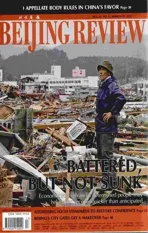The Sun Also Rises
2011-12-24ByDINGZHITAO
By DING ZHITAO
The Sun Also Rises
By DING ZHITAO
A devastating 9.0-magnitude earthquake shaking the ground, a cataclysmic tsunami engul fi ng everything in its path, and a runaway nuclear breakdown still looming large—these scenes spreading across the globe through all media outlets seemed even more dreadful than what we saw in the disaster movieJapan Sinks. They shocked and terri fi ed the world. But they failed to bring to their knees the suffering residents of the island nation. In the face of the most severe disaster since World War II, Japan remained calm, restrained and digni fi ed.
A collective image of the Japanese nation is based on the actions of its people—silent victims who narrowly escaped the tsunami’s black tide supporting one another and fi ghting their way to safety;disaster victims giving their own limited food to the elderly and very young; teachers shutting down schools’ electric supplies before an emergency evacuation; volunteers at the failing nuclear facility telling their families they were not coming back home.
Besides the strength of its citizens, Japan can also rely on its infrastructure and institutions. Soon after the quake struck, schools—always the safest buildings in the country—functioned well as sanctuaries. Enterprises launched emergency plans to ensure the continuity of their business activities. The media provided timely information but never fi xated on the public agony. The disaster relief effort has involved government at all levels, institutes of all kinds, and people in all walks of life.
The calmness and discipline are not accidental. The orderliness and graciousness of Japanese citizens that have impressed the world since the disaster are the result of long-term training and cultivation that permeates all aspects of Japanese society. The Japanese people know people cannot go it alone when disasters strike—they must help and depend on each other to survive. A solid and far-reaching disaster preparedness system, consisting of government, communities, enterprises, schools and individuals, supports a nation when unprecedented calamities occur.
Confronting the triple disaster of earthquake, tsunami and nuclear fallout, Japan will not sink. The Japanese people are healing their wounds and rebuilding their lives and communities. The future is uncertain and complicated—food and medication are insuf fi cient; many homes are in ruins; and the risk of nuclear contamination remains high. But we know nobody can be 100-percent prepared for the unexpected. Japan’s challenge is the common challenge of mankind. After all, in the face of natural and man-made disasters, no one is an island.We feel Japan’s pain and suffering. We hope Japan recovers and rises from the ruins.
